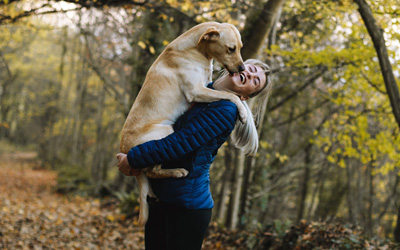No-one likes to think of these wriggly creatures affecting our furry companions, but they pose a real risk to our pet’s health.
What types of worms can affect dogs?
- Roundworms look like pieces of string and can be 18cm long.
- Tapeworms are long flat forms that can look like grains of rice in the poo or around the pet’s bottom.
- Lungworms – as the name suggests – live in the airways and can result in severe disease both here and in other parts of the body.
How do dogs get worms?
 Mostly by licking or sniffing worm eggs or larvae.
Mostly by licking or sniffing worm eggs or larvae.
Eggs or larvae can survive on the ground for weeks or months (or in some cases, years!). Some can be transported by air and larvae can move by themselves. The dog does not have to lick at an obviously soiled area to catch worms.
Hookworm larvae can burrow through skin into the dog (and people!), and can also be licked up by the dog cleaning its paws after a walk.
Tapeworms and lungworms usually have a complicated lifecycle, requiring another animal as an ‘in-between’ host, such as fleas or snails.
How would I know if my dog has worms?
Sadly, most of the time, there are no signs to see. Owners of an infected dog may feel sure that their pet does not have any worms. However, unless treated regularly for worms, it’s likely that your pet will be carrying them.
Heavy worm infestations can cause severe disease – this can be life-threatening in puppies.
Heavy worm burdens can cause the following:
- Weight loss
- Poor coat quality
- Vomiting and diarrhoea
- Pneumonia and other respiratory problems
- Skin irritation
- Anaemia or bleeding disorders
- Sometimes problems in other organs
How can I prevent worms in my dog?
Regular worming treatment is vital. Veterinary worming products are safe and effective. Adult dogs should be wormed every 3 months as a minimum. Families with children and elderly people can safely treat for roundworms monthly- ask us about a suitable product.
Spot on treatments and tablets are both available. We will be happy to advise you on what is most suitable for your pet. Puppies will need to have several worming treatments to complete their initial course, before going onto a regular programme.
Always remember to clear up after your dog with poo bags. This will help to prevent contamination of an area and is part of responsible pet ownership.
Can humans get worms from pets?
 The short answer is yes! Roundworms can be transferred from pets to people, which is one of the reasons it’s important to treat your pet regularly. Most infected people have no symptoms, but sometimes liver problems, epileptic seizures and blindness are reported, though rare.
The short answer is yes! Roundworms can be transferred from pets to people, which is one of the reasons it’s important to treat your pet regularly. Most infected people have no symptoms, but sometimes liver problems, epileptic seizures and blindness are reported, though rare.
Children are more susceptible to infection, as they like to to play in, and will sometimes eat contaminated soil.
Hookworm larvae can burrow themselves into the skin of both dogs and humans causing an intensely itchy form of dermatitis.
We recommend regular worming to ensure that your dog stays healthy, but also to protect your family and other people in the community from worm-related health problems. As your clinic team for advice on your pet.

